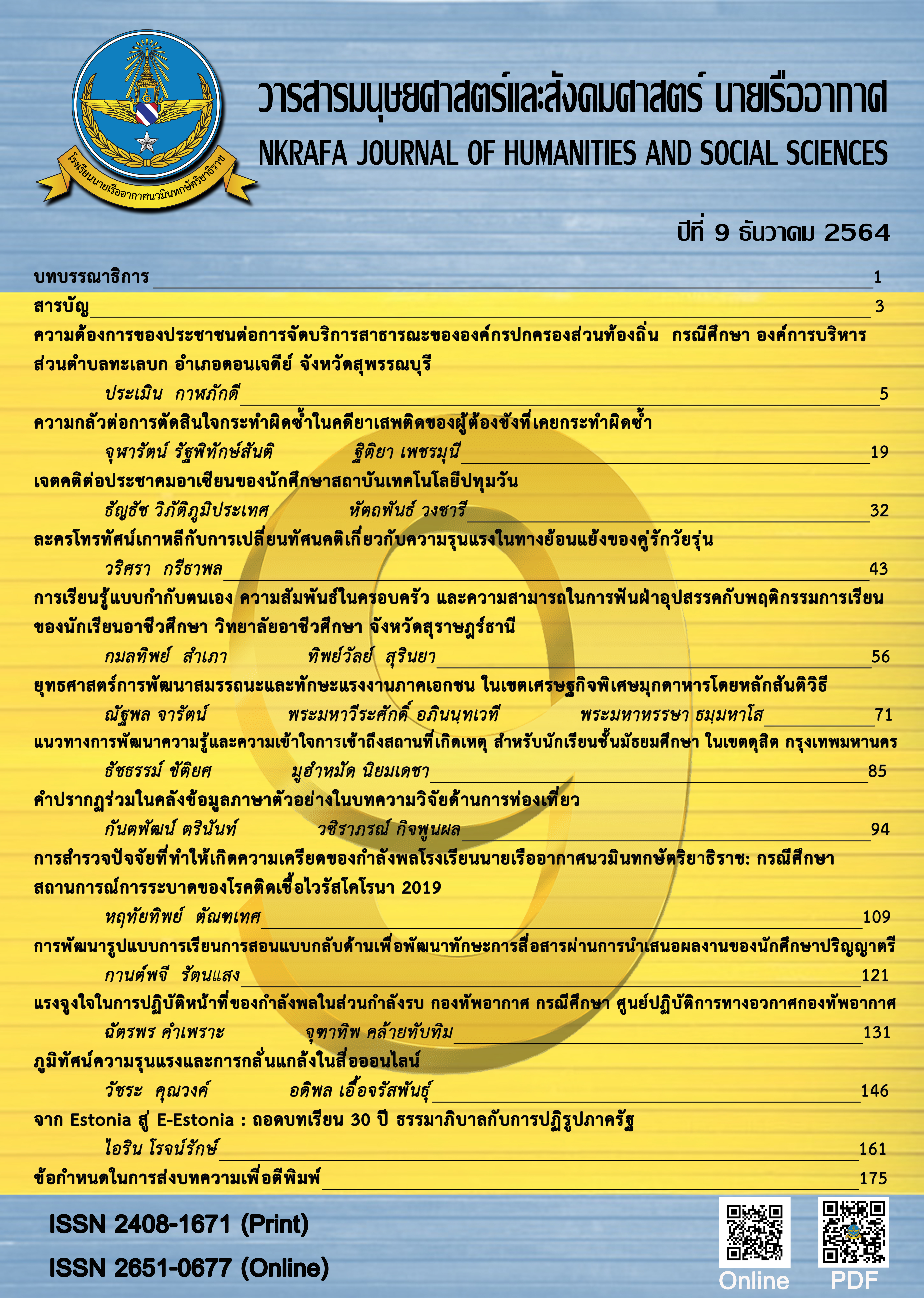The Korean Drama Series and the Change of the Teenage Couples' Attitude toward Dating Violence in a Paradoxical Direction
Main Article Content
Abstract
The purposes of this qualitative research are (1) to interpret the Korean drama series' contents that can change Thai teenage couples' attitudes toward dating violence in a paradoxical direction, and (2) to study Thai teenage couples' attitudes toward dating violence after watching the Korean drama series. The results of this study revealed that the Korean drama series' contents can change Thai teenage couples' attitudes toward dating violence in a paradoxical direction by presenting the gentlemanly and non-violent male characters as their main protagonists. According to this reason, the audiences understand the Korean society following the Korean drama series’ contents and tend to imitate their behaviors even though the Korean society is, in reality, a patriarchal society which men use violence against women. This research will be the guideline and knowledge for the related institution to make drama series that can change the Thai teenager’s attitudes toward dating violence and reduce the imitate violence behaviors from the media.
Article Details
บทความที่ได้รับการตีพิมพ์เป็นลิขสิทธิ์ของวารสารมนุษยศาสตร์และสังคมศาสตร์ นายเรืออากาศ
ข้อความที่ปรากฎในบทความแต่ละเรื่องในวารสารวิชาการเล่มนี้ เป็นความคิดเห็นส่วนตัวของผู้เขียนแต่ละท่าน ไม่เกี่ยวข้องกับโรงเรียนนายเรืออากาศฯ และคณาจารย์ท่านอื่น ๆในโรงเรียนนายเรืออากาศฯ แต่อย่างใด ความรับผิดชอบขององค์ประกอบทั้งหมดของบทความแต่ละเรื่องเป็นของผู้เขียนแต่ละท่าน หากมีความผิดพลาดใด ๆ ผู้เขียนแต่ละท่านจะรับผิดชอบบทความของตนเองแต่เพียงผู้เดียว
References
ภากิตติ์ ตรีสุกล, หลักนิเทศศาสตร์, พิมพ์ครั้งที่ 7, กรุงเทพฯ: ศูนย์หนังสือมหาวิทยาลัยราชภัฎสวนสุนันทา, 2554.
ทิวดอร์, แดเนียล, มหัศจรรย์เกาหลี: จากเถ้าถ่านสู่มหาอำนาจทางเศรษฐกิจและวัฒนธรรม, (ฐิติพงษ์ เหลืองอรุณเลิศ, ผู้แปล), กรุงเทพฯ: โอเพ่นเวิลด์ส พับลิชชิ่ง เฮาส์, 2560.
Hoon, Kim Young. “Understanding Korea’s 20th Century Popular Culture” in Understanding Contemporary Korean Culture, edited by Choi Joon Sik, Hahm In Her, Kim Mi Hyun, Kim Young Soon and Lee Ki Sung. Seoul: Jimoondang, 2011.
_______. (2558). “ทำความเข้าใจกับ “ความรุนแรงในคู่รักวัยรุ่น””. [Online].Available : http://3c4teen.org/?p=1747. [Accessed : 21 เมษายน 2563].
เข็มทิพย์ ภะรตะศิลปิน, “ทัศนคติของผู้บริโภคต่อการนำเสนอภาพบทบาทเพศชายในภาพยนตร์โฆษณา”. วิทยานิพนธ์ปริญญามหาบัณฑิต, จุฬาลงกรณ์มหาวิทยาลัย, กรุงเทพฯ, 2547.
Solomon, M. R., Consumer behavior, 4th ed., Upper Saddle River, NJ: Prentice-Hall, 1999.
อรวรรณ ปิลันธน์โอวาท, การสื่อสารเพื่อโน้มน้าวใจ, กรุงเทพมหานคร: สำนักพิมพ์จุฬาลงกรณ์มหาวิทยาลัย, 2542.
The World Health Organization (WHO), Violence: A Public health priority, Geneva Switzerland: n.p., 1995.
World Health Organization, World report on violence and health: summary, Geneva: World Health Organization, 2002.
องค์การอนามัยโลก, กรอบแนวคิดและนิยามการกระทำความรุนแรง, Retrieved from http://stin.ac.th/th/file.pdf , 2545.
Lee, M., Women’s education, work and marriage in Korea, Seoul: Seoul National University Press, 1998.
เสนาะ เจริญพร, ผู้หญิงกับสังคมในวรรณกรรมไทยยุคฟองสบู่, กรุงเทพฯ: มติชน, 2548.
บุญเสริม หุตะแพทย์, หน่วยที่ 1 แนวคิดและทฤษฎีที่เกี่ยวข้องกับชายหญิง, กรุงเทพฯ: มหาวิทยาลัยสุโขทัยธรรมาธิราช, 2545.
อนุชิต สว่างแจ้ง, “การให้ความหมายความเป็นชายและการมีเพศสัมพันธ์ที่ส่งผลต่อรูปแบบของพฤติกรรมการมีส่วนร่วมของผู้ชายในการวางแผนครอบครัว”. วิทยานิพนธ์ปริญญามหาบัณฑิต, มหาวิทยาลัยมหิดล, กรุงเทพฯ 2546.
Milestone, K., & Meyer, A, Gender and popular culture: Polity, 2012.
ราชบัณฑิตยสถาน, พจนานุกรมราชบัณฑิตยสถาน พ.ศ. 2554 เฉลิมพระเกียรติพระบาทสมเด็จพระเจ้าอยู่หัวเนื่องในโอกาสพระราชพิธีมหามงคลเฉลิมพระชนมพรรษา 7 รอบ 5 ธันวาคม 2554, กรุงเทพฯ: นานมีบุ๊คส์, 2554.
สุภางค์ จันทวานิช, ทฤษฎีสังคมวิทยา, พิมพ์ครั้งที่ 7, กรุงเทพฯ: สำนักพิมพ์แห่งจุฬาลงกรณ์มหาวิทยาลัย, 2559.
กาญจนา แก้วเทพ, การศึกษาสื่อมวลชนด้วยทฤษฎีวิพากษ์: แนวคิดและตัวอย่างงานวิจัย, กรุงเทพฯ: โรงพิมพ์ ภาพพิมพ์, 2541.
ภากิตติ์ ตรีสกุล, หลักนิเทศศาสตร์, พิมพ์ครั้งที่ 7, กรุงเทพฯ: ศูนย์หนังสือมหาวิทยาลัยราชภัฏสวนสุนันทา. 2554.
Croteau, D., & Hoynes, W., Media/Society: technology, industries, content, and users: SAGE Publications, 2018
นภวรรณ ตันติเวชกุล, “การวิเคราะห์อิทธิพลของภาพยนตร์โฆษณาทางโทรทัศน์ ตามแนวทฤษฎีการอบรมบ่มนิสัยทางวัฒนธรรมต่อเยาวชนในสถานศึกษา”, วิทยานิพนธ์ปริญญาดุษฎีบัณฑิต, จุฬาลงกรณ์ มหาวิทยาลัย, 2542.
ทิพยา สุขพรวิทวัส, “พฤติกรรมการเปิดรับและการเลียนแบบสื่อละครโทรทัศน์เกาหลี ของผู้ชมในเขตกรุงเทพมหานคร”, วิทยานิพนธ์ปริญญามหาบัณฑิต, มหาวิทยาลัยรามคำแหง, 2550.


